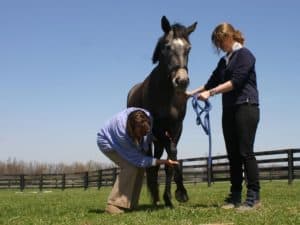U.K. Associations Back Equine Passport Program
The British Equestrian Federation (BEF) and the British Equine Veterinary Association (BEVA) last week expressed support for revised equine passport program regulations presented before Parliament on May 20. United Kingdom horse owners should
- Topics: Article, Horse Identification
The British Equestrian Federation (BEF) and the British Equine Veterinary Association (BEVA) last week expressed support for revised equine passport program regulations presented before Parliament on May 20. United Kingdom horse owners should have applied for a passport for their animals from one of the registered passport-issuing organizations (PIOs) by June 30.
Beginning Feb. 28, 2005, passports must be presented whenever horses move from one premise to another, travel to competitions, are used for breeding, leave the United Kingdom, are sold, or are presented for slaughter.
The 2003 passport regulations were amended to improve clarity, address technical legal points raised by a committee of Parliament, and reflect concerns expressed by some welfare organizations. Originally, the June 30 deadline was for obtaining a passport, but it was changed to a deadline for applying for the passport to avoid a “bottleneck in the event of a last-minute surge of applications near the deadline,” according to the U.K.’s Department for Food, Environment, and Rural Affairs (Defra). Additionally, there was a change to when the declaration of whether or not the horse is ultimately intended for human consumption has to be signed. The horse owner now can sign the declaration at any time after receipt of the passport, but must sign it before the horse is exported, is sent for slaughter for human consumption, or before administering any drugs forbidden in food animals.
According to Defra, “Signing the ‘not intended’ declaration removes any option of slaughtering the animal for food at a later point in its life, and offering horse owners this new flexibility may help prevent potential welfare problems associated with animals nearing the end of their lives which cannot be sent to an abattoir. However, one consequence of this greater flexibility is that people administering medicines may need to record their use in more passports
Create a free account with TheHorse.com to view this content.
TheHorse.com is home to thousands of free articles about horse health care. In order to access some of our exclusive free content, you must be signed into TheHorse.com.
Start your free account today!
Already have an account?
and continue reading.

Written by:
Stephanie L. Church, Editorial Director
Related Articles
Stay on top of the most recent Horse Health news with












